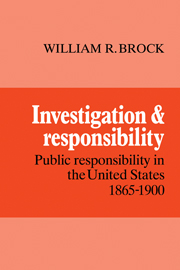Book contents
- Frontmatter
- Contents
- Dedication
- Preface
- 1 Public responsibility
- 2 Theory and practice
- 3 Public responsibility and the law
- 4 The charities of the State
- 5 The boards of public health
- 6 The bureaus of labor statistics
- 7 The railroad commissions
- 8 Toward the future
- Appendix 1 State agencies: some representative samples
- Appendix 2 Checklist of reports issued by boards of state charities, boards of public health, bureaus of labor statistics, and railroad commissions, 1865–1900
- Essay on sources and historiography
- Bibliography
- Index
1 - Public responsibility
Published online by Cambridge University Press: 03 May 2010
- Frontmatter
- Contents
- Dedication
- Preface
- 1 Public responsibility
- 2 Theory and practice
- 3 Public responsibility and the law
- 4 The charities of the State
- 5 The boards of public health
- 6 The bureaus of labor statistics
- 7 The railroad commissions
- 8 Toward the future
- Appendix 1 State agencies: some representative samples
- Appendix 2 Checklist of reports issued by boards of state charities, boards of public health, bureaus of labor statistics, and railroad commissions, 1865–1900
- Essay on sources and historiography
- Bibliography
- Index
Summary
In The American Commonwealth James Bryce noted that Americans readily ascribed “the prosperity of the country to … non-interference as well as to the self-reliant spirit of the country,” but that in practice “the new democracies of America are just as eager for state interference as the democracy of England, and try their experiments with even more lighthearted promptitude.” In the first edition of 1888 he included tables to illustrate the extent of legislation on public health, liquor, railroads, conditions of work in factories, shipping, employment of seamen, and the licensing of physicians. A table of laws and examples drawn from twentysix states illustrated “the tendency to extend state intervention.” In the third edition, published in 1895, the tables were dropped – perhaps because the laws and topics had become too numerous to list in this way – but the examples had become more numerous.
Bryce had had considerable difficulty in obtaining accurate information about state legislation. He corresponded with Herbert Baxter Adams at Johns Hopkins about the lack of literature on the subject and suggested that one or more political science graduates might study laissez faire in the states. The outcome was that in November 1886 Albert Shaw, later to achieve distinction as editor of the American Review of Reviews, sent an article to Bryce for comment and in hope of publication in an English journal.
- Type
- Chapter
- Information
- Investigation and ResponsibilityPublic Responsibility in the United States, 1865–1900, pp. 1 - 23Publisher: Cambridge University PressPrint publication year: 1984



